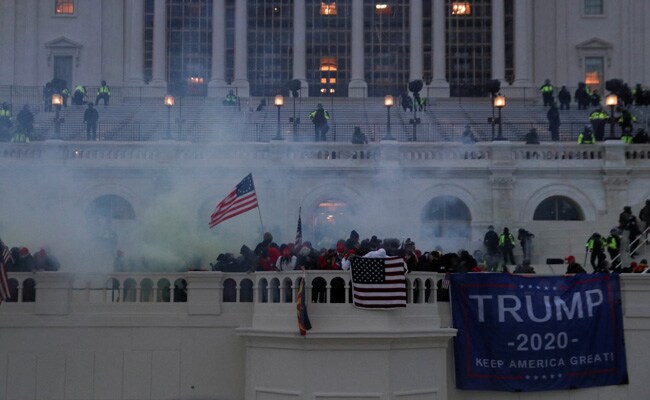
The U.S. Supreme Court said Friday that prosecutors overstepped the line in charging Jan. 6 rioters with obstruction who tried to stop the 2020 presidential election from being certified, throwing hundreds of cases into doubt.
The case was brought to the court through an appeal by former police officer Joseph Fisher, a supporter of former President Donald Trump who entered the Capitol in Washington along with hundreds of others on January 6, 2021.
Chief Justice John Roberts, writing the opinion for the majority, said prosecutors’ interpretation of the law “would criminalize a broad range of common conduct, putting activists and lobbyists in prison for decades.”
He wrote that the government “must establish that the defendant has caused, or attempted to cause, damage to the availability or integrity of records, documents, items or other things used in official proceedings.”
The case was decided 6-3, with Ketanji Brown Jackson joining the court’s conservatives. Trump-appointee Amy Coney Barrett dissented, joined by liberal Justices Sonia Sotomayor and Elena Kagan.
The case will now head to a lower court, which will decide whether Fisher’s indictment can still stand in light of the narrow interpretation of “obstruction.”
In total, 52 rioters have been convicted and sentenced on obstruction charges alone, 27 of whom are currently in prison, the Justice Department said in a statement. About 249 people have been charged with obstruction in addition to another felony or misdemeanor.
“This decision will have no impact on the vast majority of the more than 1,400 defendants charged for their illegal actions on January 6,” Attorney General Merrick Garland said.
– Meaning of ‘otherwise’ –
The core issue of the case was how to interpret the word “otherwise” in the relevant law, the Sarbanes-Oxley Act, which was enacted following the destruction of documents in the 2001 Enron scandal.
It provides for up to 20 years in prison for those who corruptly tamper with documents to prevent their use in government proceedings, or “obstructs, influences, or impedes, or attempts to obstruct, any government proceeding.”
The majority said the word “otherwise” gives prosecutors excessive leeway, allowing them to pursue charges that far exceed the scope of Congress’s initial intent.
“The peaceful transfer of power is a fundamental democratic norm, and those who attempted to disrupt it in this way have inflicted a profound wound on this Nation,” Jackson wrote, agreeing with the court’s conservatives. “But today’s case is not about the immorality of those acts.”
In her dissent, Barrett said the fact that the joint session of Congress on Jan. 6 was an official proceeding was not in dispute.
“Given these grounds, the case that Fisher can be prosecuted for ‘obstructing, influencing, or hindering an official proceeding’ appears to be fairly clear,” he wrote, accusing the majority of “flitting the text to find some way” to limit the reach of the relevant subsection.
The case also has potentially significant implications for Trump, who faces four felony charges brought by special counsel Jack Smith over his alleged efforts to overturn the results of the 2020 election.
The Republican presidential candidate has been charged with conspiracy to defraud the United States, conspiracy to obstruct an official proceeding, and obstruction of an official proceeding – the session of Congress convened to certify Biden’s victory.
They are also accused of conspiring to deprive Americans of their right to vote and count their votes.
But the case will remain on hold until the Supreme Court rules on Trump’s claim that he is immune from criminal prosecution, which the justices are expected to rule on Monday.
(Except for the headline, this story has not been edited by NDTV staff and is published from a syndicated feed.)







